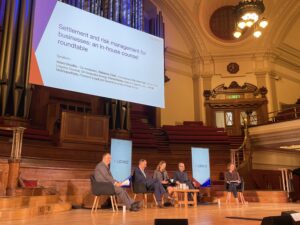The first day of the LIDW main conference began with a short introduction by Richard Bamforth, Chair of the LIDW Strategy Group, and partner at CMS. Bamforth reiterated the theme of LIDW 2022 reminding those in attendance that there is a question mark at the end of theme: “Dispute Resolution-Global, Sustainable, Ethical?” This means, as explained by Bamforth, that it is essential that we ask questions: Is dispute resolution indeed global, sustainable and ethical? If it is, why? And, how are these goals achieved in practice?
First Panel Discussion: Examining the Lives of Dispute Resolution Professionals
 Along these lines, the first panel discussion, “If you’re going through hell, keep on going” – a motivational statement for its time from Winston Churchill, but how sustainable is that approach for the modern-day disputes professional?, examined the life of a commercial disputes lawyer and of those practising in litigation and arbitration, asking whether “winning at all costs” is sustainable in the long term, given our enhanced awareness of the toll that being a dispute resolution professional may take on those involved in our profession.
Along these lines, the first panel discussion, “If you’re going through hell, keep on going” – a motivational statement for its time from Winston Churchill, but how sustainable is that approach for the modern-day disputes professional?, examined the life of a commercial disputes lawyer and of those practising in litigation and arbitration, asking whether “winning at all costs” is sustainable in the long term, given our enhanced awareness of the toll that being a dispute resolution professional may take on those involved in our profession.
The panel was moderated by Ed Crosse, Partner, Simmons & Simmons, and included distinguished speakers, each representing different aspects of the industry.: The Rt. Hon. Lady Justice Carr DBE; Simon Davis, Past President, the Law Society of England & Wales; Anya George, Partner, Schellenberg Witmer; Maryann McMahon, Head of Litigation, EMEA, Morgan Stanley; Stuart Ritchie QC, Fountain Court.
As explained by Ed Crosse, in 2021, LawCare published its “Life in the Law Survey”, which showed that 42% of lawyers in the UK identified as being at a high risk of burn out, with 69% reporting that they had experienced mental ill-health in the previous 12 months. While our raison d’etre is the resolution of disputes, are the practices and procedures we use and deploy fit for purpose in today’s environment? Also it is important to note that the panel highlighted that only 24% of the survey respondents were men, which, in itself is an important aspect of the survey.
The panel first focused on the reasons why one makes the choice to practice in dispute resolution, for solicitors, barrister, judges, and arbitrators, invariably, the answer lies in the variety of matters that one comes across. At the same time the speakers confirmed that there is some awareness that this work comes with stress and challenges. Speaking of challenges, Maryann McMahon emphasized that, as disputes are emerging, they already come to lawyers with a ‘domino’ of stress, given the complexity of the relations, negotiations, performance of contracts etc., and as such, practitioners should be careful not to become a conduit of stress, meaning that practitioners must absorb a lot of stress without passing it on. Simon Davis pointed out that great challenges might come from the lawyers themselves: many talented lawyers are highly sensitive to any criticism, while some are so immersed in the matter that the clients’ problems become their burden. Stuart Ritchie QC emphasized that, for barristers, another challenge is that of the solitary profession and, as such, one must realize when help is needed.
Anya George concluded that the challenges for arbitration practitioners come from the fact that there are no common standards in arbitration proceedings and conducts, which can affect the schedule of a case and burden the work-life balance of arbitrators and arbitration practitioners. Lady Justice Carr emphasized that the court sees the complexity of the profession and the challenges faced by practitioners. In particular, these aspects are visible at the end of a trial when responsibility shifts from the parties’ counsel to the judge so that the decision may be rendered.
The panel discussion concluded with top tips for dispute resolution practitioners, highlighting that it is time to address this topic more often and in a proper manner. The main recommendation was to speak up about the challenges as a dispute resolution lawyer, judge or arbitrator, and also ask for help when that is necessary.
Second Panel Discussion: The In-house Counsel Perspective on Dispute Resolution
 The second panel of the first day of the main LIDW 2022 conference focused on the in-house counsel experience in settlement and the resolution of disputes: Settlement and risk management for businesses: an in-house counsel roundtable. The panel asked various questions: Do business use mediation, or arbitration (or something else?). Do they also seek settlement after they have obtained an award rather than seek enforcement before courts? How do they gain stakeholder engagement for a different course of action? And once decided, how do they prepare?
The second panel of the first day of the main LIDW 2022 conference focused on the in-house counsel experience in settlement and the resolution of disputes: Settlement and risk management for businesses: an in-house counsel roundtable. The panel asked various questions: Do business use mediation, or arbitration (or something else?). Do they also seek settlement after they have obtained an award rather than seek enforcement before courts? How do they gain stakeholder engagement for a different course of action? And once decided, how do they prepare?
The panel was moderated by Artem Doudko, Partner, Osborne Clarke, and Rebecca Clark, IPOS Mediation, and included as speakers: Kai-Uwe Karl, Global Chief Litigation Counsel, GE Renewable Energy; Fiona Meany, Head of Litigation, JLL; and Abhijit Mukhopadhyay, President (Legal) and General Counsel, Hinduja Group. The speakers were unanimous in emphasizing that one has to look at the business interests of users in choosing the adequate dispute resolution mechanism. Kai-Uwe Karl noted that in the case of GE, the vast majority of disputes settle, while a minority, not necessarily represented by high value claims, proceed with litigation or arbitration. Furthermore, the speakers mentioned that for in-house counsel, the primary focus is to first negotiate and try to settle disputes. And in doing so, while legal arguments play an important role, the focus should be on the business driven factors. For this, as Fiona Meany emphasized, in a negotiation, one must have the right persons at the table: not only those with the power to decide and commit the parties, but also the in-house counsel who is familiar with the business. In speaking about settlement, Abhijit Mukhopadhyay stressed the importance of the drafting of the contracts: most disputes arise out from poorly drafted contracts, and for this reason the collaboration between internal and external counsel is of utmost importance: the external counsel must be the extended arm of the legal department of the client.
More coverage from LIDW is available here.
________________________
To make sure you do not miss out on regular updates from the Kluwer Arbitration Blog, please subscribe here. To submit a proposal for a blog post, please consult our Editorial Guidelines.


